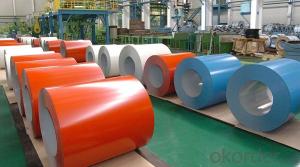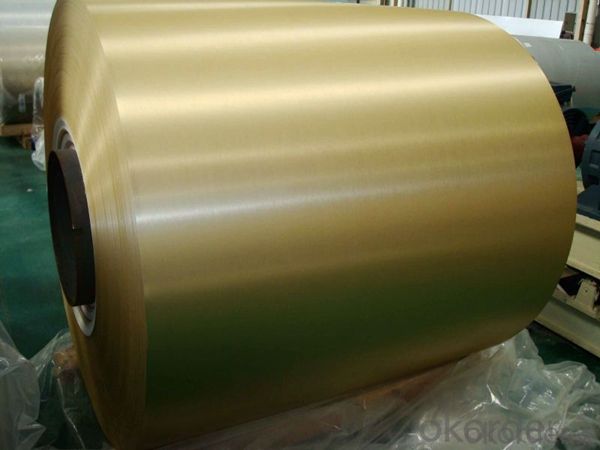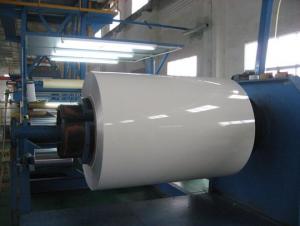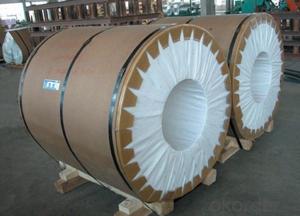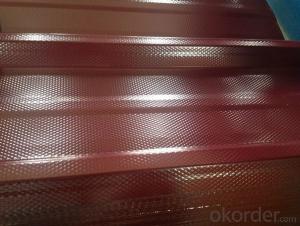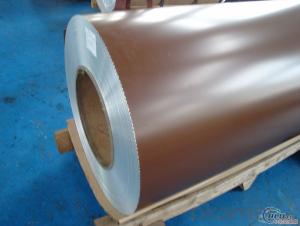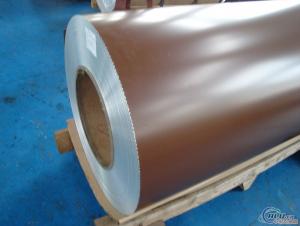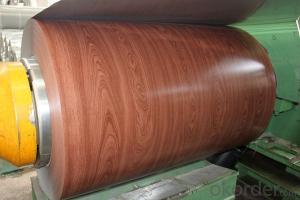York Aluminum Coils - Color Coated Aluminum Coil AA3003 for Decoration
- Loading Port:
- Shanghai
- Payment Terms:
- TT OR LC
- Min Order Qty:
- 5 m.t.
- Supply Capability:
- 10000 m.t./month
OKorder Service Pledge
OKorder Financial Service
You Might Also Like
Specification
1. Specification of Color Coated Aluminium Coil AA3003 for Decoration
characteristics | Application |
1) Super peeling strength | 1) Building exterior curtain walls |
2) Excellent surface flatness and smoothness | 2) Decoration and renovation additions for old buildings |
3) Superior weather, corrosion, pollutant resistance | 3) Decoration of interior walls, ceilings, bathrooms, kitchens and balconies |
4) Even coating, various colors | 4) Shop door decorations |
5) Fireproof, excellent heat and sound insulation | 5) Advertisement board display platforms and signboards |
6) Superior impact resistance | 6) Wallboards and ceilings for tunnels |
7) Lightweight and easy to process | 7) Industrial materials, materials for vehicles and boats |
2. Application of Color Coated Aluminium Coil AA3003 for Decoration
(1).Interior: wall cladding, ceilings, bathrooms, kitchens and balconies, shutters, doors...
(2).Exterior: wall cladding, facades, roofing, canopies, tunnels, column covers , renovations...
(3).Advertisement: display platforms, signboards, fascia, shop fronts...
3. Feature of Color Coated Aluminium Coil AA3003 for Decoration
• Our goods quality is top, the surface is smooth, and every steel coil
• No Joint, No Bends, no spots, no roller marks.
• MTC will be provided with goods, third part inspection is acceptable, for example, SGS, BV. Etc
Be free from Oil Stain, Dent, Inclusion, Scratches, Stain, Oxide Dicoloration, Breaks, Corrosion, Roll Marks, Dirt Streaks and other defect which will interfere with use
4. Certificate:
SGS and ROHS(if client request, paid by client), MTC(plant provided), Certificate of Origin(FORM A, FORM E, CO), Bureau Veritas and SGS (if client request, paid by client), CIQS certificate
5. Image of Color Coated Aluminium Coil AA3003 for Decoration
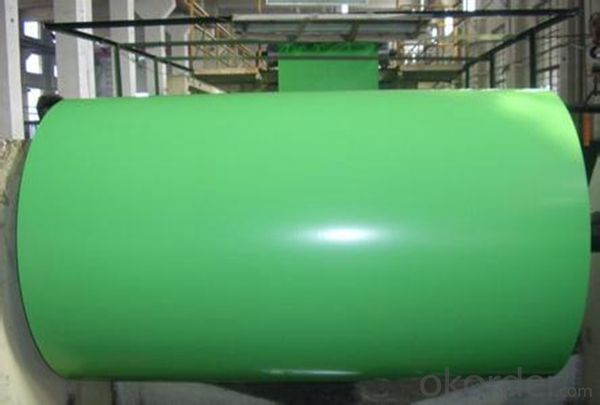
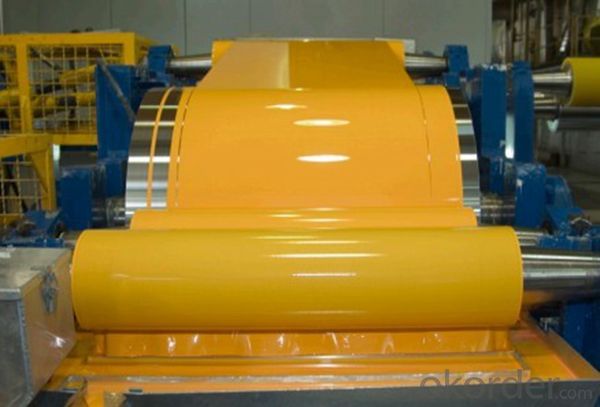
6. Package and shipping of Color Coated Aluminium Coil AA3003 for Decoration
eye to wall
eye to the wall
with wood pallet (wooded case also available)
7. FAQ
1) What is the delivery time?
Dpends on actual order, around 20 to 35 days
2)What is the QC system:
We have QC staff of 20 persons and advanced equipment, each production is with MTC traced from Aluminum ingot lot.
3) What market do you mainly sell to?
Australia, America, Asia, Middle East, Western Europe, Africa etc
- Q: Can aluminum coils be used in the production of heat shields?
- Heat shields can indeed be made using aluminum coils. Aluminum is a preferred option for heat shields because of its exceptional thermal conductivity, lightweight characteristics, and ability to reflect radiant heat effectively. Typically, heat shields are designed to safeguard delicate components or structures from excessive heat generated by engines, exhaust systems, or other sources. By shaping and sizing aluminum coils, one can create efficient heat shields that disperse heat and prevent its transfer to surrounding areas. Furthermore, aluminum exhibits corrosion resistance, making it suitable for applications where heat shields may encounter harsh environments or chemicals. All in all, aluminum coils are an appropriate material choice for producing heat shields due to their thermal properties, adaptability, and long-lasting nature.
- Q: What is the typical hardness of aluminum coils?
- The typical hardness of aluminum coils can vary depending on various factors such as the alloy composition, tempering process, and intended application. Generally, aluminum coils are manufactured in a range of hardness levels to cater to different needs and requirements. Aluminum coils can be produced in different tempers, including soft, half-hard, and full-hard. Soft aluminum coils have low hardness and are more malleable, making them suitable for applications that require easy formability such as packaging and wrapping materials. Half-hard aluminum coils are moderately hardened and offer a balance between formability and strength, making them suitable for applications like roofing and siding. Full-hard aluminum coils have the highest hardness and provide excellent strength, making them ideal for applications that require structural integrity such as automotive parts and construction materials. To determine the specific hardness of aluminum coils, various testing methods such as Rockwell hardness, Vickers hardness, or Brinell hardness can be employed. These tests measure the resistance of the aluminum surface to indentation and provide a numerical value that indicates the material's hardness. However, it is essential to consult the manufacturer or supplier for specific hardness values as it can vary depending on the specific alloy and temper of the aluminum coil.
- Q: Are there any limitations or restrictions on the use of aluminum coils?
- Aluminum coils come with limitations and restrictions that need to be taken into account. Some of the key limitations are as follows: 1. Corrosion: Aluminum is prone to corrosion, especially when exposed to certain chemicals or environments. This means it may not be suitable for applications where it will encounter corrosive substances or highly corrosive environments. 2. Strength: Although aluminum is lightweight, it lacks the strength of metals like steel. This limits its use in applications requiring high strength or load-bearing capabilities. 3. Temperature sensitivity: Aluminum has a lower melting point compared to other metals, which can be a drawback in applications involving high temperatures. It may not be suitable for certain industrial or high-temperature environments. 4. Electrical conductivity: While aluminum has good electrical conductivity, it falls short of copper's conductivity. This can limit its use in applications requiring high electrical conductivity, such as electrical wiring or power transmission. 5. Cost: Aluminum can be more expensive than other metals, making it less favorable in cost-sensitive applications. In such cases, alternative materials may be preferred. 6. Formability: Compared to some other metals, shaping or forming aluminum coils can be challenging. This restricts their use in applications that demand complex shapes or tight tolerances. When selecting aluminum coils for a specific purpose, it is crucial to consider these limitations and restrictions. A careful evaluation of the particular requirements and constraints will help determine whether aluminum coils are suitable or if alternative materials should be considered.
- Q: Are aluminum coils suitable for soundproofing applications?
- Typically, soundproofing applications do not involve the use of aluminum coils. Although aluminum is an effective conductor of heat and electricity, it lacks the sound-dampening properties found in other commonly used soundproofing materials like foam, rubber, or dense fibers. These materials are designed to absorb and block sound waves, thereby reducing noise transmission. Conversely, aluminum coils are commonly utilized in HVAC systems or as a building exterior material due to their durability and heat transfer capabilities. Consequently, if the primary goal is soundproofing, it is advisable to explore alternative materials specifically engineered for that purpose.
- Q: Is it safe and appropriate to use aluminum coils for food packaging?
- <p>Yes, aluminum coils can be used for food packaging. Aluminum is a common material in the food packaging industry due to its lightweight, durability, and excellent barrier properties against light, oxygen, and moisture. It is widely used in the production of flexible packaging, such as pouches, laminates, and foils. However, it's important to ensure that the aluminum coils meet food-grade standards and are used in accordance with food safety regulations to prevent any contamination or health risks.</p>
- Q: What are some common applications for aluminum coils?
- Some common applications for aluminum coils include manufacturing of roofing materials, HVAC systems, automotive parts, electrical wiring, packaging materials, and construction materials.
- Q: How do aluminum coils contribute to increased structural stability?
- Several factors contribute to the increased structural stability provided by aluminum coils. Firstly, the material itself, aluminum, is highly durable and possesses an excellent strength-to-weight ratio. This means that despite being lightweight, aluminum coils offer superior strength and stability, making them an ideal choice for various structural applications. Additionally, the corrosion resistance of aluminum coils is crucial for maintaining structural integrity over time. Unlike other metals, aluminum does not easily rust or deteriorate, even in harsh environmental conditions. This corrosion resistance ensures that the coils will remain structurally sound and reliable for extended periods. Moreover, aluminum coils exhibit high thermal conductivity, allowing for efficient heat transfer. This characteristic is particularly beneficial for structures exposed to temperature variations, as it facilitates the even distribution and dissipation of heat. By doing so, it prevents potential damage caused by thermal expansion or contraction. Another significant advantage of aluminum coils lies in their flexibility. Aluminum is a malleable material that can be easily bent, shaped, and formed into various configurations. This flexibility enables the coils to adapt to different structural requirements, allowing for more intricate designs and enhancing overall stability. Furthermore, aluminum is a non-combustible material, making it a safe choice for structural applications. In the event of a fire, aluminum coils will not contribute to the spread of flames, thus maintaining the integrity of the structure and ensuring the safety of occupants. In conclusion, the durability, corrosion resistance, thermal conductivity, flexibility, and fire-resistant properties of aluminum coils all contribute to increased structural stability. These characteristics make aluminum coils a reliable and efficient choice for a wide range of structural applications, providing long-lasting stability and safety.
- Q: Can aluminum coils be used in the production of fire-resistant structures?
- Indeed, the utilization of aluminum coils is possible for the fabrication of fire-resistant structures. Being inherently fire-resistant and possessing a remarkably high melting point, aluminum emerges as an excellent substance for structures that necessitate endurance against elevated temperatures. In the realm of construction, aluminum coils are frequently employed to fulfill fire-resistant requirements, including roofs, walls, and insulation. Moreover, the lightweight and durability of aluminum further facilitate the installation and maintenance of fire-resistant structures.
- Q: Can aluminum coils be used in vacuum applications?
- Yes, aluminum coils can be used in vacuum applications. Aluminum is a commonly used material in vacuum systems due to its excellent properties such as low outgassing, high thermal conductivity, and good corrosion resistance. These properties make aluminum coils suitable for various vacuum applications, including but not limited to, vacuum chambers, vacuum pumps, cryogenic systems, and particle accelerators. However, it is important to note that aluminum can be reactive with certain gases or chemicals, so it is essential to consider the specific requirements and compatibility of the vacuum application before using aluminum coils.
- Q: Can aluminum coils be used in the manufacturing of aircraft parts?
- Yes, aluminum coils can be used in the manufacturing of aircraft parts. Aluminum is a lightweight and durable material that is widely used in the aerospace industry due to its high strength-to-weight ratio and corrosion resistance. The coils can be formed and machined into various components such as fuselage skins, wings, and structural frames, making them an ideal choice for aircraft manufacturing.
Send your message to us
York Aluminum Coils - Color Coated Aluminum Coil AA3003 for Decoration
- Loading Port:
- Shanghai
- Payment Terms:
- TT OR LC
- Min Order Qty:
- 5 m.t.
- Supply Capability:
- 10000 m.t./month
OKorder Service Pledge
OKorder Financial Service
Similar products
Hot products
Hot Searches
Related keywords
